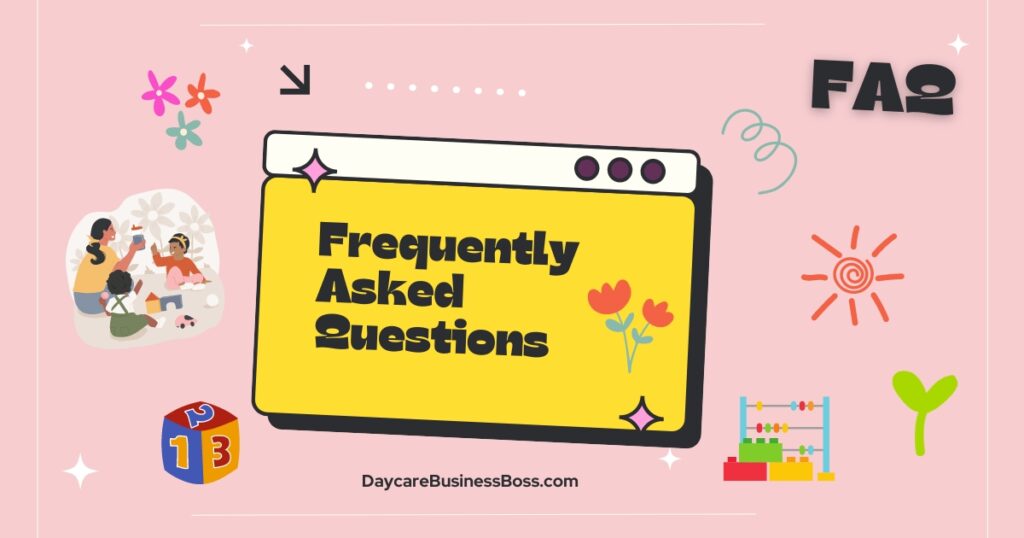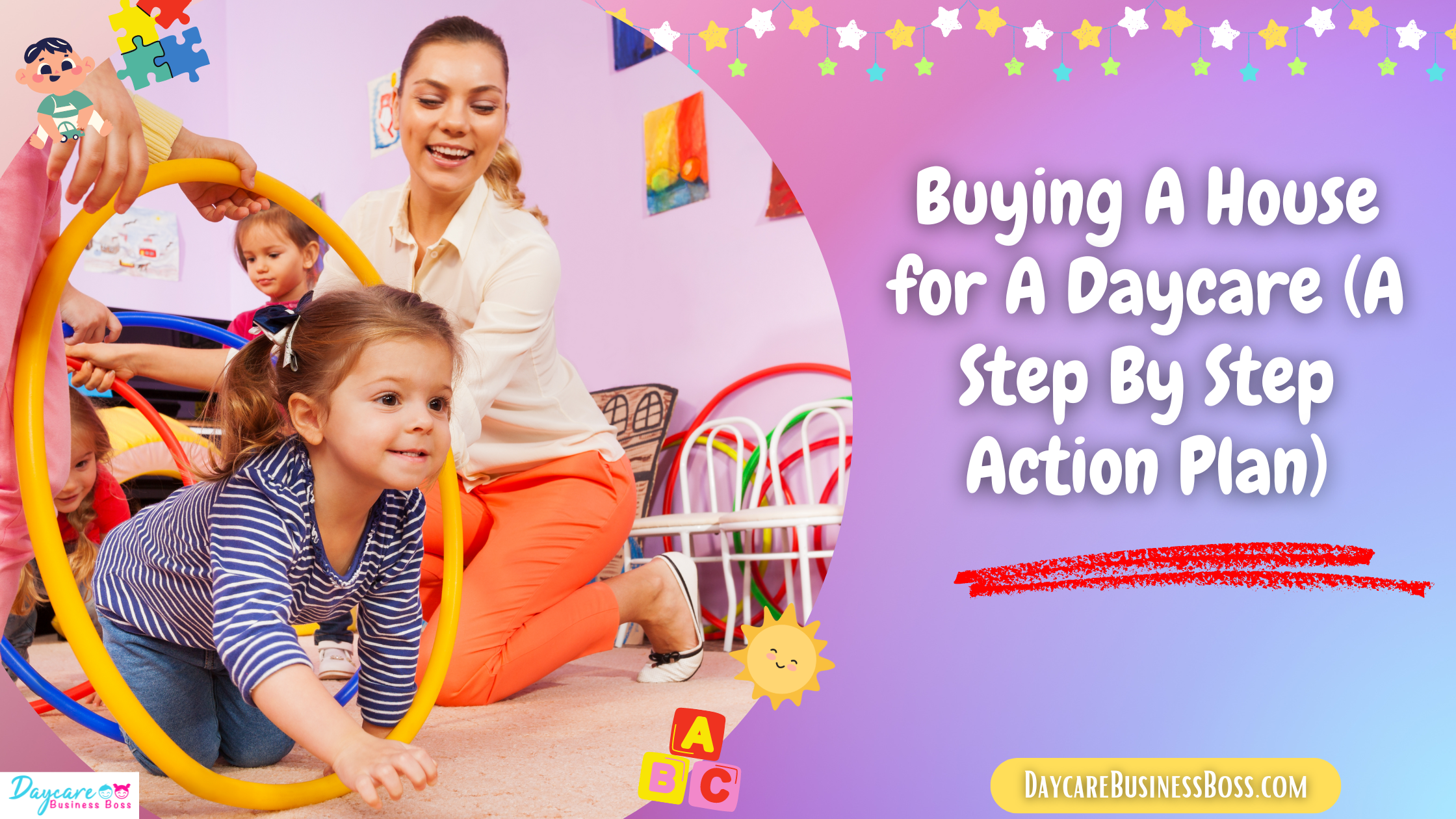n this day and age when parents and guardians are getting busier and busier with their occupations, many are turning to daycares. Parents have so many options to consider—centers, family, homes—so what can make your daycare stand out? Many are looking for a personal touch, which can come from turning a house into a home away from home. Buying a house is already a daunting task, though, so you’re asking yourself, “how do I buy a house for my in-home daycare?”
Here are the steps to buying a house for a daycare:
1) Familiarize yourself with licensure laws and work through the state to obtain your license.
2) Create a business plan.
3) Meet your state’s age and education requirements to obtain a license.
4) Set a budget and consider your loan options.
5) Determine how much space you will need
6) Find a neighborhood with a need for daycare.
7) Consider the neighborhood zoning laws.
8) Find a house that can easily be converted if necessary.
For more information on the step-by-step process, read on.
1. Research your community’s licensure laws.
How many children are permitted in the house at one time? When are you considered a center rather than a family daycare? These are all questions to ask before you consider purchasing a home for your business.
Some states require you to live in the same place in which you run the daycare, while others do not require you to have a license at all if you have less than six children. Most states require you to complete an application, pay a fee, and get a background check when a license is required.
Terminology like “small family daycare” or “large family daycare” is important. Before you even be looking for a home, make sure you know what you want to do.
A basic, or small, family daycare is typically around six children, while the larger daycare is around ten to twelve. During this step, you can determine how large of a center you would like to have.
Although some states do not require a license, many parents may not consider sending their child to your in-home daycare if you do not have licensure through the state.
Learn more about licensing HERE.
2. Make a business plan.
What do you want to do? That is the first question when considering buying a house for daycare. Operations, management, finances, and staffing are just a few of the things you need to think about before even considering real estate in your area.
When making this business plan, also consider your legal structure. Are you planning on going under your name as a sole proprietor, working with another person as a partnership, or creating incorporation or limited liability company? Each one has its benefits, and you must pick the one that is best for you.
In this business plan, it is important to also consider insurance. Daycare insurance exists to cover these issues, like liability if a child is injured when at your daycare.
Your business plan should also contain your teaching philosophy—your in-home daycare is not just a babysitting business, and parents and guardians will expect you to help teach their children basics, depending on what age they are.
During this process, you should also determine a name for your business—when considering a business name, make sure it reflects your values and what you hope to achieve in your daycare business. You can also choose to brand and protect it—information can be found at the U.S. Small Business Administration website.
For help writing a business plan, check out the U.S. Small Business Administration website.
In this business plan, you should also consider how you will bill for your daycare and report to parents their growth and development, along with any research you complete about the licensure process.
3. Meet your state’s age and education requirements to obtain a license.

Depending on the size of the daycare, you may need to have some sort of certified director or licensee, an assistant, or a business license. Other states may require a physical or health exam.
You may also want to get certified for CPR; some states do require this certification.
Some states also require you to attend education or an orientation.
You can find more information about your state by searching for the human services, family resources, or childcare and health department.
4. Set a budget and consider your loan options.
Once you determine your business plan and your licensing options, you can move on to creating a budget.
Depending on your plan, it may be difficult to get a loan for a home if running a daycare is to be your primary income. Understand that when approaching banks for a loan to buy a house for this endeavor may be a hard road; many banks may require you to be in business for five years either before the loan or in this new house.
While obtaining a loan for a personal home is different than finding one for an in-home daycare, the process is similar. The bank or loan officer will consider your job history, credit history, down payment ability, before telling you how much you can borrow for the mortgage loan.
Having your business plan is essential here; showing them that you have a growth plan is a big step in obtaining that loan.
Depending on whether you intend on running your daycare in your house or are buying an additional house, finances are vastly different. If you buy a second home, all the supplies, furniture, etc. that you buy can be written off your taxes, but you will be paying for a mortgage on a second home, leaving you with the possibility of less profit. Decide which is more beneficial to you when making your financial plan.
During this step, it’s important to differentiate your finances from your business finances. Make sure you understand the federal and state taxes for your business and consider opening a business bank account. The U.S. Small Business Administration has resources to help in creating a budget and what steps you need to take.
Within this financial plan and in conjunction with your business plan, consider how much you will need to charge for each child. Once you determine how to fund your business and home purchase, you can start determining the physical attributes of your home business.
5. Know how much space you need.
Looking for a house that suits you and your family may not be enough. When you’re looking to start a daycare, make sure you’re finding a home that will suit your needs in terms of space, size, and layout.
What’s the best layout? While the layout is up to you and your preferences, know how much space you’ll need for each child. At the very least, you will need room to provide meals, a kitchen, a play area, and a nap area.
When making this determination, understand that some states have square footage requirements based on each child. This may change depending on your location and community, so consider this when checking out neighborhoods.
6. Find a neighborhood with a need for daycare.
Purchasing a home in a neighborhood with many children is your goal—find the demand and stick within a small area. Also consider the market size, the saturation, and income of the surrounding area said the U.S. Small Business Administration.
On top of that, consider the location and its ease of access. Parents and guardians should be able to find the business and park without difficulty.
Safety should be your number one concern. Consider the house’s proximity to highways or train tracks, industrial locations, and even schools. Understanding the zoning laws of the community can also help you determine whether changes could be made in the future that may negatively affect your business.
7. Consider the neighborhood zoning laws.
The bigger you go, the more likely you must have the location rezoned. Frequently, neighbors do not want the high number of children in the area and may object to that rezoning.
While your real estate agent should understand the need for zoning, make sure you double-check.
Also, know the zoning of the surrounding buildings. Down the road, homes may be torn down and rezoned for new buildings or businesses that may negatively affect your location, safety of the children, and property value.
8. Find a house that can easily be converted if necessary.
Depending on the size of the location and number of children, you may need to obtain a fire safety clearance. States may also require the location to be ADA compliant. By finding a house that may only need some work, you’re saving yourself money down the road.
Parents are looking for a caring environment with enriching activities, good staff, a good learning curriculum, and emergency procedures.
Consider checking with the U.S. Small Business Administration for more information about opening your in-home daycare center, along with a more generalized checklist for opening a small business, found here.
RELATED QUESTIONS

How do I market my in-home daycare?
When advertising for a daycare, focus on the local neighborhood and surrounding areas. Parents will want to stay close to home. Look to social media, such as Facebook, try to spread by word of mouth, and make sure you have an accessible website.
What kind of equipment do I need for an in-home daycare?
Equipment needed for an in-home daycare includes toys, furniture, cleaning supplies, safety supplies, napping supplies, and ways of communicating with parents. Some states require you to have a certain number of items based on how many children you are watching. Check with your state childcare or health department for more details.
Please note: This blog post is for educational purposes only and does not constitute legal advice. Please consult a legal expert to address your specific needs.
To learn more on how to start your own daycare checkout my startup course and documents here.

Meet Shawn Chun: Entrepreneur and Childcare Business Fan.
I’m a happy individual who happens to be an entrepreneur. I have owned several types of businesses in my life from a coffee shop to an import and export business to an online review business plus a few more and now I create online daycare business resources for those interested in starting new ventures. It’s demanding work but I love it. I do it for those passionate about their business and their goals. That’s why when I meet a childcare business owner, I see myself. I know how hard the struggle is to retain clients, find good employees and keep the business growing all while trying to stay competitive.
That’s why I created Daycare Business Boss: I want to help childcare business owners like you build a thriving business that brings you endless joy and supports your ideal lifestyle.

